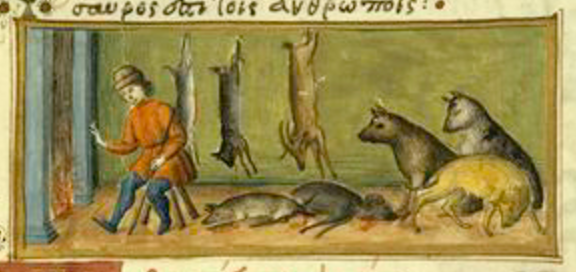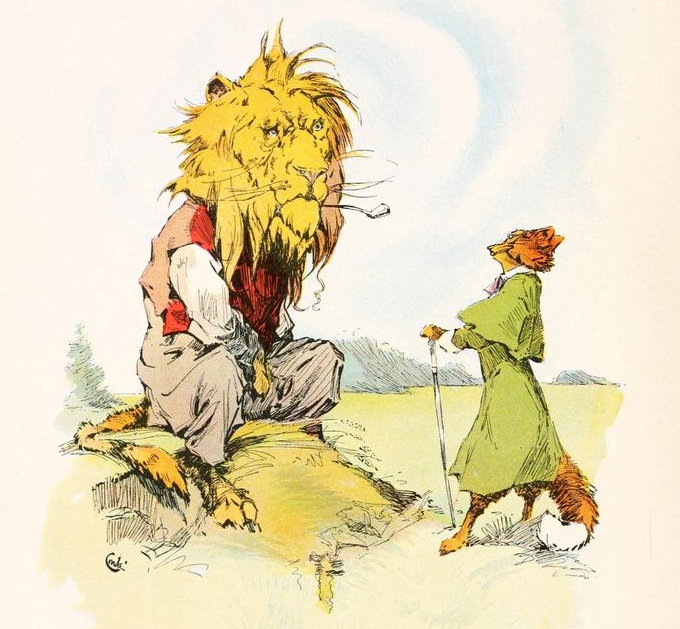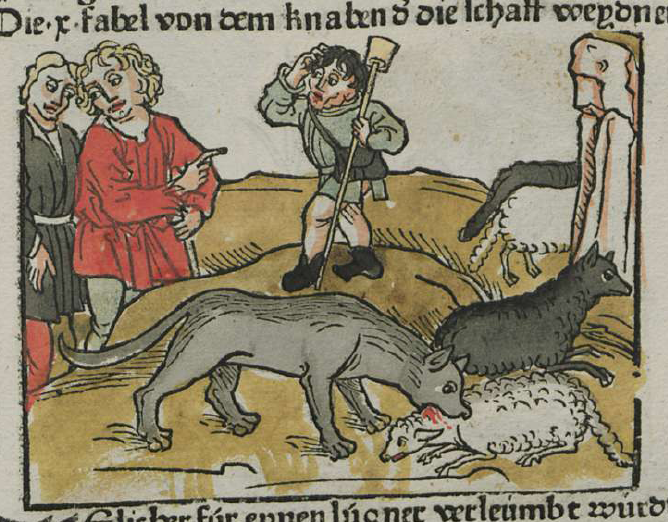41. Of the Husbandman and the Dogs
The husbandman, when he had wintered in the country many days, began at length to labour with the want of necessary things; he killed his sheep, afterwards also his goats, lastly also he slays his oxen that he may have wherewith he may sustain his body, almost exhausted with want. The dogs, seeing that, resolve to seek safety by flight, for that they should not live longer when their master has not spared his oxen indeed, whose labour he used in doing his country work.
Moral. If thou art willing to be safe, withdraw from him soon whom thou seest reduced to those straits that he consumes the instruments necessary for his works whereby he may be supplied for the present want.

42. Of the Fox and the Lion
The fox, who was not wont to see the fierceness of the lion, having viewed that beast once and again, trembled and fled. When now a third time the lion had offered himself in his way, the fox feared not anything, but confidently goes up to and salutes him.
Moral. Custom makes us all bolder, even among those whom scarce before we have dared to look upon.

43. Of the Fox and the Eagle
The young of the fox ran abroad; caught by the eagle, she implores the help of her dam. She runs up, asks the eagle that she would dismiss her captive young. The eagle, having got her prey, flies away to her young. The fox, a fire-brand being snatched up, as if she was about to destroy her fortress with fire, when now she had gotten upon the tree, says, "Now defend thyself and thine, if thou canst." The eagle, trembling, while she fears the fire, says, "Spare me; I will restore whatsoever I have of thine.
Moral. Understand by the eagle, the potent and bold; by the fox, the poor, whom the rich oftentimes oppress by force. But the hurt sometimes soundly revenge the injury received.

44. Of the Husbandman and the Stork
The cranes and the geese feeding on the corn, the countryman sets a gin. The cranes are taken, the geese are taken, and the stork is taken. She entreats, crying, that she was innocent and was neither a crane, nor a goose, but the best of all birds, as who always used to serve her father diligently and to nourish him worn out with old age. The husbandman says, "Well know I all these things, but since we have taken thee with the offending, thou shalt die also with them."
Moral. He that committeth a crime, and he who joins himself a companion to the wicked, are punished with equal punishment.

45. Of the Shepherd and the Countrymen
A boy fed his sheep upon a higher ground, and crying both thrice and four times in jest that the wolf was there, he raised the countrymen on all sides; they, being deluded too often, whilst they do not come to him imploring help, the sheep become a prey to the wolf.
Moral. If any one has been used to lie, faith will not be had easily in him when he shall have begun to tell the truth.

No comments:
Post a Comment
Comments are limited to Google accounts. You can also email me at laurakgibbs@gmail.com or find me at Twitter, @OnlineCrsLady.